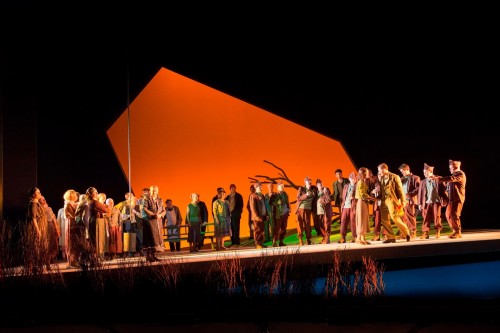 United Kingdom Janáček, Jenůfa (1916 edition): Soloists, Chorus and Orchestra of Opera North, Alexandar Marković (conductor), The Lowry Theatre, Salford Quays. 11.11.2015. (RJF)
United Kingdom Janáček, Jenůfa (1916 edition): Soloists, Chorus and Orchestra of Opera North, Alexandar Marković (conductor), The Lowry Theatre, Salford Quays. 11.11.2015. (RJF)

Janáček, Jenůfa
Cast:
Jenůfa: Ylva Kihlberg
Kostelnička: Susan Bickley
Grandmother: Elizabeth Sikora
Števa Buryja: Daniel Norman
Laca Klemeň: David Butt Philip
Foreman: Dean Robinson
Karolka: Daisy Brown
Mayor: Jeremy Peaker
Mayor’s Wife: Claire Pascoe
Maid: Beth Mackay
Barena: Sarah Estill
Jano: Frankie Bounds
Production:
Director: Tom Cairns
Set & Costumes: Tom Cairns
Lighting: Wolfgang Göbbel
Choreographer: Aletta Collins
English translation: Otakar Kraus & Edward Downes
My review season seems to be one gruesome story after another. Welsh National Opera’s Sweeney Todd was billed as a musical and seen at Llandudno (review) in half term week! I wondered how many nightmares it stimulated? If that wasn’t gruesome enough how about Janáček’s tale of infanticide? It tells the story of Kostelnička, who might be termed the stepmother from hell, who kills the baby of her ward Jenufa and buries the body in the frozen ice. The reason for this is that Jenufa gave birth the child without the benefit of marriage, as it was termed, and thus illegitimate and a cause of great shame. This is barely comprehensible today as nearly half of children in the UK are born to a mother who is not married or even in partnership with the father. The not unusual story is of a feckless drunkard who refuses entreaties to marry the girl and thus legitimise the child to save the family honour. Kostelnička hides Jenufa for the birth and pleads with the feckless Števa, father of the child to marry the girl. He will not and the consequences unfold as the body of the child is discovered in the frozen ice on the day Jenufa is about to marry the dependable Laca, whose love she had earlier spurned, and who slashed her face with a sharpened whittling knife to reduce her attraction to his rival.
The story is stark and so is Janáček’s dramatic, and at times strident, music. The music might fill The Lowry with sound, but the composer’s oeuvre does not have a lot of support in the UK and in terms of audience there were, regrettably, acres of empty seats. I say regrettably because both the production and the performance were of the highest order. Opera North have a history of championing Janáček and has staged several of his rarely performed operas, such as From The House of the Dead in 2011, Katya Kabanova, and The Makropolus Case in 2012. This production was first seen in 1995.
Janáček’s works have dramatic power and although they lack the melodic invention of the Italian school of composers they are a valid component of the wider operatic oeuvre and justify their inclusion in the repertoire. Such validity, I suggest, helps justify the subsidy that Opera North and the other opera companies get from The Arts Council. The set for each of the acts is simple but effective in use of space and creating a setting for the drama that unfolds particularly with the use of back-lit gauze drops. Add a production set, conductor, orchestra, soloists and chorus up to the composer’s demands and an excellent night was available. Aleksandar Marković conducted a well-paced and modulated performance of Janáček’s 1916 orchestration allowing many words to be heard, though the titles are a necessity for full understanding of the evolving plot details.
Of the singers there were no weaknesses, but several outstanding acted and sung performances. These came from Susan Bickley as Kostelnička, David Butt Philip as Laca Klemeň along with Ylva Kihlberg in the title role who had sung Emilia Marty in the 2012 performances of The Makropolus Case. Notable also were Elizabeth Sikora as the Grandmother whilst Daniel Norman, stepping in for two performances, sang Števa with clear lyric tone and conveyed the feckless and caddish nature of the role well.
Robert J Farr
